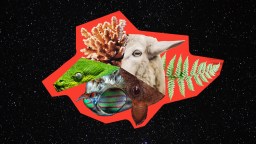biology
A large new study puts caffeine-drinking moms on alert.
Scientists use high resolution microscopy and computer simulations to create first ever video of DNA movements.
Researchers analyze prehistoric viruses in animals dug out from the Siberian permafrost.
One million year old mammoth DNA more than doubles the previous record and suggests that even older genomes could be found.
A study says nature’s candy can be a valuable supplement to sunblock.
While other factors exist, sexual prowess appears to have helped determine the role of Protoceratops frills.
Robot developers adapt the behavior of worm “blobs”.
Imagine poisoning your rival and yourself and giving only yourself the antidote.
For the first time, it was discovered that nonphotosynthetic bacteria have a circadian clock.
Participation in community science programs has skyrocketed during COVID-19 lockdowns.
The main bioactive compound in catnip seems to protect cats from mosquitoes. It might protect humans, too.
Darwin was right again—sort of.
Scientists discover burrows of giant predator worms that lived on the seafloor 20 million years ago.
Scientists regenerate damaged spinal cord nerve fibers with designer protein, helping paralyzed mice walk again.
Researchers discover that cancer cells go into hibernation to avoid chemotherapy effects.
This small-scale study may have uncovered a new link between the peripheral nerve system and autism.
Traces of heroin and cocaine have been found in the tartar of 19th-century Dutch farmers.
Previous research suggesting it’s all about prolactin may be missing the mark.
What lies in store for humanity? Theoretical physicist Michio Kaku explains how different life will be for your descendants—and maybe your future self, if the timing works out.
▸
15 min
—
with
Scientists find that an RNA-DNA mix may have created the first life on our planet.
Scientists find a new species of flower in a remote part of Hawaii.
The search for alien life is far too human-centric. Our flawed understanding of what life really is may be holding us back from important discoveries about the universe and ourselves.
▸
6 min
—
with
Jonathan Berman wants us to have better dialogues.
Fractal patterns are noticed by people of all ages, even small children, and have significant calming effects.
There is a neurological link between serotonin levels and the brain’s ability to control impulses and patience levels.
The Google-owned company developed a system that can reliably predict the 3D shapes of proteins.
A biologist-reporter investigates his fungal namesake.
Researchers from Israel reversed two key processes involved in aging.





























